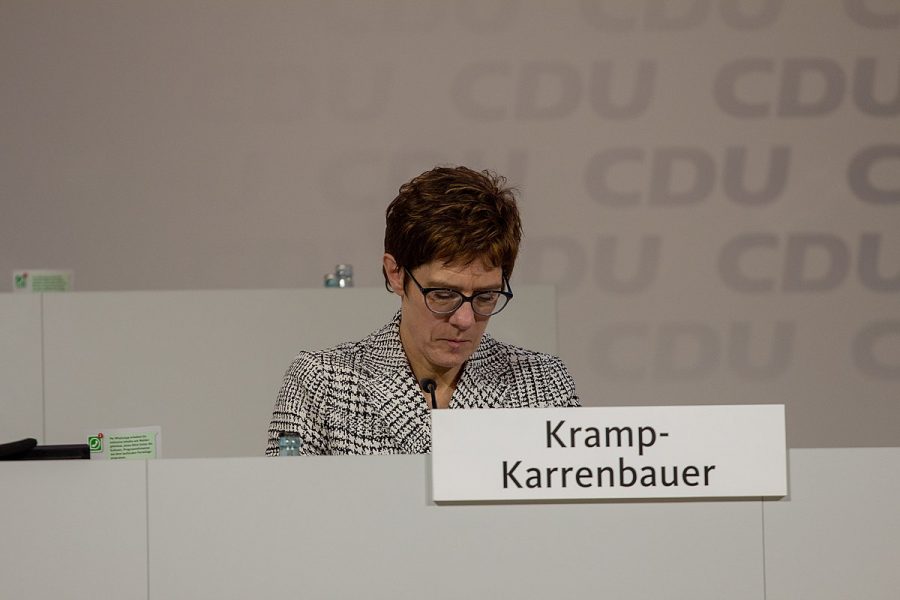Kramp-Karrenbauer announces resignation from CDU leadership position
Olaf Kosinsky.info@kosinsky.eu.55128 Mainz.0157/35795197
Photo by: Olaf Kosinsky https://kosinsky.eu/ https://creativecommons.org/licenses/by-sa/3.0/
February 24, 2020
It was a bombshell that hit German politics: Annegret Kramp-Karrenbauer, often referred to as AKK, announced that she would be stepping down as the leader of the Christian Democratic Union (CDU). After serving as the chairperson of Germany’s biggest party for a little more than one year, AKK’s decision appeared somewhat surprising. However, it was not completely unexpected.
AKK’s rise to the party’s most important political position was contested. After a lead-up filled with speculation, AKK won the chairmanship with 51.75% of the vote in December 2018. This result shows a large discrepancy between the approval of the CDU’s previous leader, Angela Merkel. When she was elected for the first time, Merkel received 95.94% of the votes and her lowest result in any of her following CDU leadership candidacies was 88.41%. In the 2018 election, AKK’s biggest rival, Friedrich Merz, obtained 48.25% percent of the vote.
Even after AKK assumed her new role, she was never the unifying, undisputed leader of the CDU. When the youtuber Rezo published a 55-minute video titled “The destruction of the CDU” in May 2019, in which he heavily criticized Germany’s biggest party, the CDU seemed unorganized and AKK at times helpless. Just a few days later, the CDU lost more than 6% of the national German vote in the European elections. In the following months, the CDU also lost seats in three state elections – Brandenburg, Saxony, Thuringia.
The result of the latter came to bite AKK. In February 2020, after months of negotiations, a premier for the state of Thuringia was elected – Thomas Kemmerich from the FDP. Three parties ended up voting for Kemmerich: the economically liberal FDP, the center-right CDU and the far-right AfD. This result came as a shock to many Germans. The AfD, a far-right political party, feeding on nationalism and the bashing of foreigners, had played the kingmaker. Up until this point, no party had cooperated with the AfD. It had been the consensus among the established democratic parties and the strategy to hold back a potential rise of the far-right. In this moment, however, these previous efforts had been shattered. Five days later, AKK announced her resolution to step down.
AKK’s decisions together with the latest election results constitute a shift in German politics. Both so called catch-all parties (“Volksparteien”) – the social democratic SPD and the CDU – traditionally appealing to a broad range of the electorate, have suffered from declining amounts of votes. In the 2002 German federal elections, the CDU and SPD got a combined 77% of the vote. In 2017, this number amounted to 53.4%. In European elections a similar picture can be observed. Where the CDU and SPD combined for 66% of the German vote in 2004, they acquired just 44.7% in 2019. Furthermore, both parties have struggled to find a clear leader. Where it was common for CDU leaders to be in office for extensive periods of time – in the last 45 years the CDU had only three leaders with Merkel having been the chairperson for 18 years – AKK has left the chairperson position after only one year.
With AKK stepping down, there is also the possibility of snap (or early) elections. If the new CDU chairperson wants to have a clear overview over the political landscape and start working in the government as quickly as possible, a snap election might seem like a viable option. This election might change the makeup of the German parliament and the German government.
AKK announcing that she would step down has major consequences for German politics. It emphasizes the struggle of the CDU, which is now eagerly looking for a new leader just over a year after AKK’s ascent. In discussions about a new chairperson one name is mentioned time after time. He is a familiar face – Friedrich Merz, AKK’s major rival in the last election.



